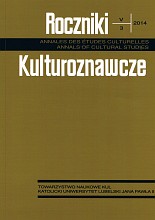Norwid - Fern vom Trivium seiner Epoche
Norwid—Far from the Canon of the Epoch
Author(s): Paweł GarbaczSubject(s): Cultural Essay, Political Essay, Societal Essay
Published by: Towarzystwo Naukowe KUL & Katolicki Uniwersytet Lubelski Jana Pawła II
Keywords: romanticism; poem; Faust; humanism; modernism
Summary/Abstract: About Freedom of Speech by Cyprian Norwid goes—like Goethe’s Faust—beyond the limits of intelligibility. “Maybe—as Heidegger claims—language requires much less hast for words, than deliberate silence.” The Polish poet cuts himself off from the canon of philosophical views—like a child who wants to discover the world in its own way, not to learn it by using knowledge and education, following the designated track. In his works Norwid abandons the canon of his epoch’s poetry and he, so to say, cuts across. He occupies an outstanding position on the background of contemporary European writers. The advocate of the motto: “art for art’s sake” Stefan Mallarmé and Norwid are definitely different as far as the attitude towards current events is concerned, however they are united in their willingness to go beyond the boundaries of the word. In Norwid’s works it is manifested by a constantly used technique of being silent and it culminates in incredible amazement and dazzle: “In this moment I touched the Resurrection with my finger / and I pronounced the word: I AM.” On the other hand, in Mallarmé’s output we deal with presenting internal images which subconsciously evoke musical vibrations. Norwid shares with Godfryd Benn the belief that the “ETERNAL MASTER” and the liberating knowledge of the Word play indispensable roles in history. On the other hand, what the Polish poet and Ezra Pound have in common are: an immense reading canon, great knowledge and extraordinary poetic images. The coming of the new epoch caused a distur-bance of the previous hierarchy of works and at the same time—as it is in Norwid’s case—a manifestation of what had not been noticed so far.
Journal: Roczniki Kulturoznawcze
- Issue Year: 5/2014
- Issue No: 3
- Page Range: 15-25
- Page Count: 12
- Language: German

